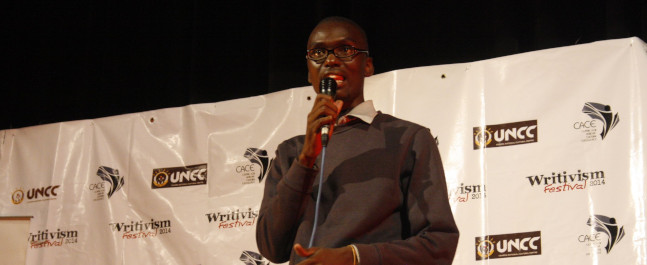Co-producing a sustainable future for African literary production

Collaborations with organisations in Africa by Bristol researchers have helped grow capacity for independent and sustainable literary production.
Research highlights
- Developed new literary infrastructures and mentorship programmes that empowered independent literary initiatives across Africa.
- Preserved African print heritage through digitisation and historical research, fostering global awareness of African literary history.
- Shifted the perception of African literary production from an economic model to a form of literary activism.
Researchers from Bristol’s multidisciplinary Centre for Black Humanities have collaborated with non-profit, grassroots organisations in Africa to develop sustainable literary infrastructures, innovative forms of literary production, and new networks and cross-cultural partnerships between the UK and five countries across Africa.
Professor Madhu Krishnan (Department of English) has drawn upon her research on how liberal worldviews and global hierarchies shaped a specific notion of "African literature" over the latter half of the twentieth century, contributing to its continued marginalisation as a literary category.
Meanwhile Professor Ruth Bush (Department of French) has called on her insight into African literature and literary translation and research that explores the destabilising impacts of decolonisation on literary form.
New literary infrastructures and mentorship
In one of the key initiatives stemming from this research, the team worked with the founder of the pan-African Writivism Literary Initiative, Bwesigye Bwa Mwesigire, to develop the annual Arts Managers and Literary Activists (AMLA) workshops.
These workshops have brought together 60 literary activists, writers, editors and translators over 15 countries across the continent.
As a result of the AMLA workshops, established African literary activists have provided critical mentorship to five new literary initiatives across East, West and Southern Africa, including the Abidjan Lit literary collective (Côte d’Ivoire) and the Mawazo Africa Writing Institute (Uganda).
New literary materials have also emerged from the workshops, including Odokonyero: A Writivism Anthology of Short Fiction by Emerging Ugandan Writers which is now used by several secondary schools in Uganda.
Teachers have reported a marked improvement in student engagement, highlighting that the relevance of the stories their lives has enhanced their appreciation of literature as a social form.
“I have been longing for a closer-to-home piece of work, and Odokonyero is timely – it is what we have been waiting for.” – Teacher in Uganda
Preserving print heritage
In an additional strand of their research, Professors Krishnan and Bush have undertaken significant archival and digitisation projects to help preserve Africa’s rich print heritage.
For two years Professor Krishnan and Dr Christopher Ouma (University of Cape Town) ran a network within the Arts and Humanities Research Council (AHRC) funded Small Magazines project.
Working with Writivism and the Cape Town-based Chimurenga collective, the network explored the role played by small magazines historically into the contemporary period.
Meanwhile, Professor Bush collaborated with partners in the UK, France and Senegal to digitise and restore the complete archive of one of the earliest francophone African women’s magazines, Awa: la revue de la femme noire.
The AHRC-funded project identified Awa as a long over-looked source for tracing debates on the (un)translatability of feminist thought between the global North and global South, post-independence nationalism, and representations of the female body in African and diasporic cultural production.
The research led to a website archive and multimedia exhibition at museums in Dakar, Montpelier and Bordeaux.
Literature as activism: contributing to a cultural shift
The research conducted by Professors Krishnan and Bush has helped reframe African literary production as a form of activism rather than solely an economic enterprise.
By collaborating with literary activists across the continent, they have contributed to a cultural shift that positions literature as a vehicle for political engagement and social transformation.
Based on this work, both Professor Krishnan and Professor Bush have subsequently engaged in large-scale research projects on literary activism and the creative lives of African universities, in each case funded by ERC Starting Grants.
Professors Krishnan and Bush are committed to fostering sustainable literary ecosystems across Africa. Their ongoing work seeks to further empower African writers, strengthen literary networks and preserve Africa’s literary heritage for future generations.
Acknowledgements
During these projects Professors Krishnan and Bush collaborated extensively with Dr. Kate Wallis from the University of Exeter and Dr. Georgina Collins, a freelance translator and researcher.
The research conducted by Professors Krishnan and Bush has helped reframe African literary production as a form of activism rather than solely an economic enterprise.
Connect with the researcher
Professor Madhu Krishnan, Professor of African, World and Comparative Literatures, Department of English
Cite the research
Krishnan M (2014), Contemporary African Literature in English: Global Locations, Postcolonial Identifications, Basingstoke: Palgrave Macmillan, [90,000 words; available on request]
Krishnan M (2018), Contingent Canons: African Literature and the Politics of Location, Cambridge University Press, [30,000 words; available on request]
Krishnan M and Bush R (2016) Print Activism in 21st Century Africa, special issue of Wasafiri [co-authored introduction], https://doi.org/10.1080/02690055.2016.1216267